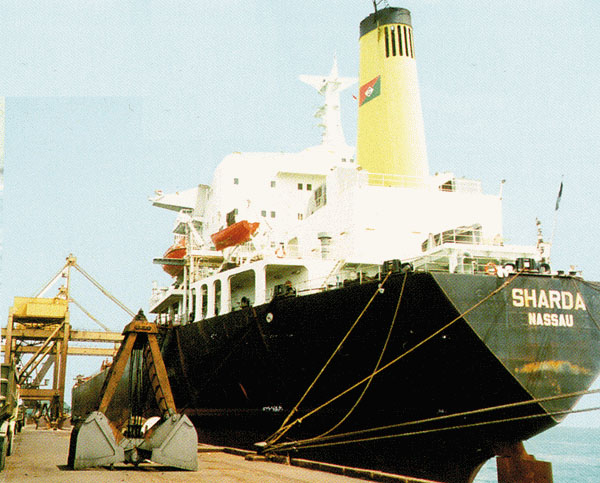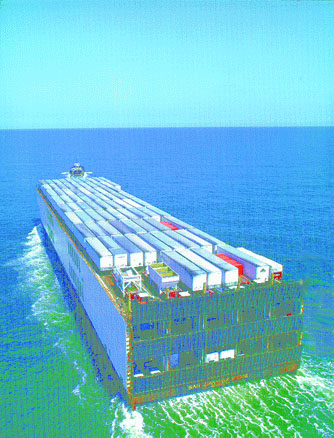Strategic Assessment/Market Analysis
Our many maritime sector research programs typically consider a host of strategic issues.
Whether the project consists of a master plan or technology assessment, the strategic analysis
component of the research program requires the ability to obtain access to candid and informative
responses from shippers and operators. In our standard practice of incorporating extensive
strategic elements into our projects, we have developed a close relationship with the carrier
industry and shippers around the world. This enables the research to gain from access to
strategic decision makers and their current insight and perspectives, many of whom in the past
have been our clients. Of our many relevant programs, the following are typical:
Development of a Transition Strategy for Assumption of Responsibility for Operation and Management of the Panama Canal
Panama
The primary objective of this effort was to assist the Panamanian
government in formulating a transition strategy for the
government's ultimate stewardship of the Panama Canal in
accordance with the Panama Canal Treaty. The Institute was
required to conduct an extensive review of shipping deployment
practices and the current situation in Panama to define issues
associated with the Canal's transfer, assist in the formulation and
analysis of alternative institutional, design and maintenance,
operating, and management arrangements, and assist in the
preparation of a plan encompassing transition strategies and a
time frame for strategy implementation. The project also
defined an action plan towards the ultimate transfer of the Canal.
Strategies Study for Reducing Central American Shipping Costs
Central America
Central America historically has been at a competitive disadvantage in the maritime sector,
attributed in part to the lack of economies of scale in cargo volumes and operational
inefficiencies in the region's ports. Institute researchers, under the sponsorship of the World Bank
and COCATRAM, an association of Central American transport organizations, formulated the
strategies that Central America can pursue to improve service levels and reduce costs; defined
the role that government and the private sector can play in support of these strategies; enhanced
the capabilities of the private sector to monitor and negotiate transport rates through a training
program; established a process for continuous pricing and cost data base updates and review of
maritime transport charges; formulated a program for enhancing COCATRAM's analytical skills
relative to continuous strategy review and development; and conducted training seminars for the
six countries of Central America.
Port Development Strategies Study for the Southern Sumatra and Western Java Region
Indonesia
 The effort encompassed the formulation of a long term port
development strategy for the 25-year period ending 2019.
The study formulated a variety of strategic scenarios based
on extensive analysis of trade patterns, vessel services, and
carrier industry strategies and vessel deployment practices.
Accordingly, the study identified facility requirements
based on these strategic scenarios, examined port
operational practices and vessel service requirements,
identified physical distribution practices of shippers and
carriers, examined investment and financing needs,
developed port service privatization options for a variety of
services, and formulated a long-term development strategy.
The effort encompassed the formulation of a long term port
development strategy for the 25-year period ending 2019.
The study formulated a variety of strategic scenarios based
on extensive analysis of trade patterns, vessel services, and
carrier industry strategies and vessel deployment practices.
Accordingly, the study identified facility requirements
based on these strategic scenarios, examined port
operational practices and vessel service requirements,
identified physical distribution practices of shippers and
carriers, examined investment and financing needs,
developed port service privatization options for a variety of
services, and formulated a long-term development strategy.
The Maritime System of the Americas
United States
 This research program was conducted in
cooperation with the U. S. Maritime
Administration and the Maritime Industry
Advisory Committee. The Maritime System of the
Americas links the mid-United States, Canada and
Mexico (countries of the NAFTA region) via the
Great Lakes, the U.S. inland waterways, and the
Gulf of Mexico. Through the Caribbean Sea, the
system adds linkages to Central America and the
northern rim of South America. Panama Canal
traffic is an important component of the system.
Commercial liberalization in the region has
resulted in very rapid increases in international trade. Accordingly, the objective of the program
was to provide an action plan defining the market share for maritime transportation and
determining the appropriate technologies, operating methods, and institutional framework
necessary to meet expected demand. Technological/operating options under study include
river/ocean vessels, short-sea vessels and barges, rail and trailer ferries, and conventional
intermodal shipping by ocean carriers.
This research program was conducted in
cooperation with the U. S. Maritime
Administration and the Maritime Industry
Advisory Committee. The Maritime System of the
Americas links the mid-United States, Canada and
Mexico (countries of the NAFTA region) via the
Great Lakes, the U.S. inland waterways, and the
Gulf of Mexico. Through the Caribbean Sea, the
system adds linkages to Central America and the
northern rim of South America. Panama Canal
traffic is an important component of the system.
Commercial liberalization in the region has
resulted in very rapid increases in international trade. Accordingly, the objective of the program
was to provide an action plan defining the market share for maritime transportation and
determining the appropriate technologies, operating methods, and institutional framework
necessary to meet expected demand. Technological/operating options under study include
river/ocean vessels, short-sea vessels and barges, rail and trailer ferries, and conventional
intermodal shipping by ocean carriers.